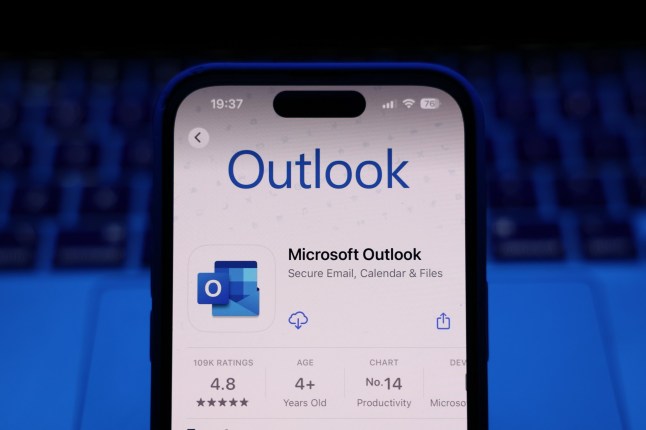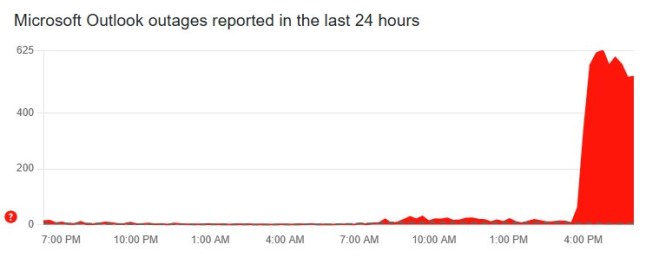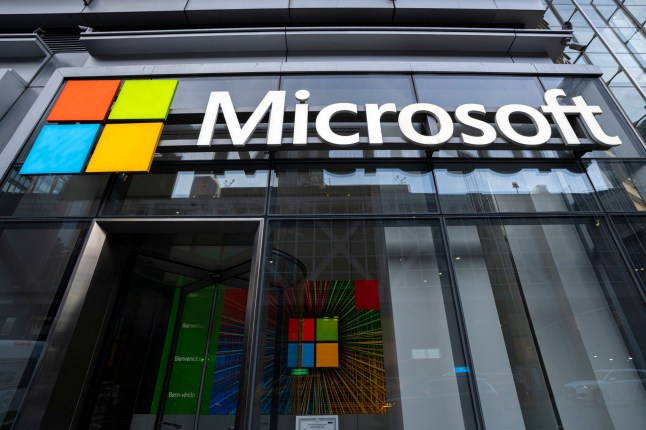
Microsoft Azure has gone down, dragging Office 365, Minecraft, X-Box Live, Copilot and many other services with it for thousands of people.
Outage tracker Downdetector showed thousands of people worldwide are having issues with websites and apps this evening.
An issue with Azure, the tech giant’s flagship cloud computing product that underpins large parts of the internet, is behind the outage.
Azure was down for more than 16,600 users and Microsoft 365, which includes Outlook and Teams, was down for nearly 9,000.

Other impacted sites include the mobile phone operator O2, Heathrow Airport and the bank Natwest.
More than 1,400 people struggled to use the Asda website and app – the supermarket said last month that Azure ‘will serve as the backbone of Asda’s digital infrastructure’.
What’s going on?
Microsoft’s Service Health Status page says the services are ‘severely degraded’.
The outage at Azure began at 4pm, impacting websites and apps that rely on Azure Front Door, which routes user traffic through Microsoft’s network.
Users may be met with delays, timeouts and error messages.
Microsoft 365 Status said on X that engineers are fixing the issue that follows a ‘recent configuration change’ to Azure.
While Microsoft says it cannot provide a timeline on when the issue will be fixed, issues should now begin to ease.
It added: ‘We’ve completed the deployment of a healthy configuration and we’re continuing our active traffic balancing efforts as well as monitoring service telemetry to ensure widespread recovery.’
What caused the issue?
The outage happened because of an issue with the domain name system (DNS), Matthew Hodgson, CEO of Element, a secure communications platform used by governments, told Metro.
‘Think of DNS as the index in an atlas; when you need to find something, you look it up in the index to get the right page and grid reference,’ he said.
‘Now imagine publishing a new edition with a missing or incorrect index. Chaos ensues. It can take hours to replace the faulty version everywhere – in this case, around six hours. That’s exactly what happened here.
‘And it’s not just an inconvenience. The big cloud providers have accumulated far too much power and responsibility. Yesterday’s outage took down the train network in the Netherlands on election day, meaning some people couldn’t get home in time to vote.’

The outage follows a similar blackout last week, when an issue with Amazon’s cloud computing platform caused global chaos.
Millions of users struggled to log into some of the world’s most popular websites and apps, including Reddit, Snapchat and Roblox.
While some issues with Amazon’s cloud service, AWS, have been reported on Downdetector, the company says it is operating normally.
Dr Saqib Kakvi, from the Department of Information Security at Royal Holloway, told Metro that when the internet only relies on a few tech providers, a single glitch can mean chaos for millions.
Companies like Amazon and Microsoft have powerful data centres around the world, so let companies rent their cloud services.
Azure commands nearly a quarter of the global cloud market, powering nearly 350,000 businesses’ websites and apps.
‘Currently, Amazon, Microsoft and Google have an effective triopoly on cloud services and storage, meaning that an outage of even part of their infrastructure can cripple hundreds, if not thousands of applications and systems,’ Dr Kakvi said.
‘Due to the cost of hosting web content, economic forces lead to consolidation of resources into a few very large players, but it is effectively putting all our eggs in one of three baskets.’
How can I protect myself during an outage?
Between mass internet outages and a spell of cyber attacks, Vonny Gamot, head of EMEA at McAfee, doesn’t blame people for being a little on edge.
He’s got a few recommendations for Metro readers on how to protect themselves during an outage:
‘Pause before you click. Be sceptical of any unsolicited message about outages, refunds, or account verification.
‘Go straight to the source. Check the official app or website status pages, don’t follow links in emails or texts.
‘Ignore urgent “fix” offers. Legitimate companies won’t ask you to download tools or send payment to restore access.
‘Watch for red flags. Requests for money via gift cards, crypto, or wire transfers are almost always scams.
‘If you clicked a suspicious link:
- Change your password immediately (and for any accounts using the same one).
- Turn on or refresh two-factor authentication (2FA).
- Monitor recent transactions and set up alerts.
- Run a trusted security scan to remove any unwanted apps or remote-access tools.’
Get in touch with our news team by emailing us at webnews@metro.co.uk.
For more stories like this, check our news page.









